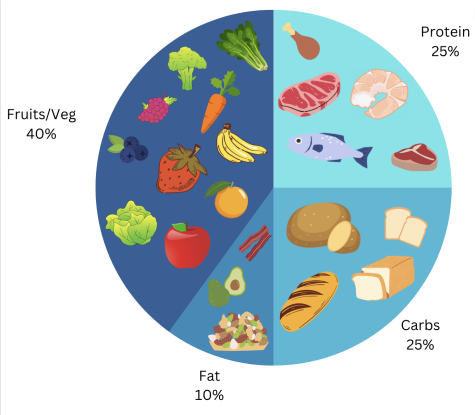Fit or Fat? Diet culture takes TCS by storm
Students enjoying a sweet treat at lunch time.
The transition from middle school to high school can be equally tough as it is exciting. Growing up also means physical changes, which can be a hard pill to swallow for many teenagers and can lead to unhealthy relationships with food and disordered eating habits. However, it does not have to be. With the right tools, it can become an opportunity to take charge of your life and health.
Comparisons with friends and social media can cause teens to develop eating disorders and cause serious health issues down the line. Healthy eating and balanced lifestyles are crucial to maintaining physical and mental well-being. It is important to promote a positive relationship with food and prioritize self-care.
Diet Culture at TCS
“Diet culture is something we don’t talk much about at school, but we all know it’s there. I see it mostly in girls, especially when we compare ourselves to others,” Ana Sofía Correa, Grade 11, said.
Diet culture and unrealistic beauty standards lead to disordered eating habits and body dissatisfaction, which affects both boys and girls at TCS.
Research shows teenage girls are twice as likely to develop an eating disorder than boys. Eating disorders affect teenage girls’ physical and mental health and often force them to conform to unrealistic beauty standards.
“I hear my friends talk about their appearances much more, and also see them fall into stupid diets like not eating sugars, or carbs, or gluten,” Sofía Thiriez, Grade 9, said.
Even though eating disorders are more common in girls, boys too struggle with comparisons and toxic relationships with food. Studies show 30% of teenage boys fall into unhealthy weight control behaviors. Boys are also affected by unrealistic standards seen on social media, pushing them towards restrictive diets and excessive exercise.
Orthorexia is an unhealthy obsession with exercise, which is statistically more common in boys than girls and can cause a person’s growth to be stunted. Especially if developed during teenage years.
“As we get older, I notice that my friends get more obsessed with the gym, to the point where it becomes an obsession. I have seen my friends stop eating carbs and sugars and just eat protein because they think it will make them look ‘fitter’,” Senior Pedro López said.
The Importance of a balanced diet
Teenagers who undereat run the risk of developing eating disorders as well as malnutrition, stunted growth, delayed puberty, compromised immune systems, and impaired cognitive function. Teens also need to consume more calories because their bodies are growing rapidly and this process uses up a lot more nutrients. Eating disorders and obsessions with weight loss not only come with a heavy toll on mental health but also have long-term health repercussions.
“I always advise my patients to focus on maintaining a balance, and understanding that their physical appearance isn’t the only thing that matters. Also, treating food and exercise as something that we need for our health and wellbeing, rather than something we do to look a certain way,” Dr. Pablo Andres Saldarriaga, Nutritionist, said.
Adolescents can prevent obesity and other health problems by developing healthy eating habits that will last them a lifetime. Consuming a range of meals, including fruits, vegetables, whole grains, lean proteins, and healthy fats, can enhance general health and fend off chronic diseases later in life. Additionally, Overeating in teenagers can lead to obesity, type 2 diabetes, high blood pressure, high cholesterol, and an increased risk of heart disease, as well as affecting their mental health and self-esteem.
Dr. Saldarriaga also shares that a balanced diet is important for physical health and mental health, particularly in teenagers who are still developing. Since by nourishing the body, we are also nourishing the mind.
A healthy relationship with food
“The first step to a healthy relationship with food is avoiding a restrictive diet and rewarding systems. Food isn’t earned, it is the fuel our bodies need to function every day,” Raquel Londoño, 2020 Alumni and Nutrition student at Monash University, said.
Londoño encourages teens to focus on balance, and not allow food to rule their lives. A balanced diet includes foods of all kinds, like carbs, protein, fat, vitamins, minerals, and more. Each food has its unique dietary value and contributes differently to our bodies, so no food should be seen as “good” or “bad,” but rather everything should be consumed with appropriate moderation.

“It is also important to keep in mind that we will never look the same as our friends or influencers we see on social media because genetics play a huge role in how our bodies look. So no matter if we follow the same plan as someone else, there will always be differences,” Londoño said.
Understanding that everybody is unique and has unique nutritional requirements is the key to ending body comparisons. Teens should focus more on eating well and exercising to preserve excellent health rather than worrying about how they look.
“My biggest advice for a young adult struggling with their relationship with food is to take it one step at a time. Nothing changes overnight, so stay positive and remind yourself that your appearance does not define you.” Dr. Saldarriaga said.
Work Cited:
Eating disorders among adolescents. Eating Disorder Hope. (2022, June 13). Retrieved February 23, 2023, from https://www.eatingdisorderhope.com/risk-groups/eating-disorders-adolescents
Center, P. T. (2019, March 28). 10 statistics of teenage eating disorders. Polaris Teen Center: Premier Adolescent Treatment Center in Los Angeles. Retrieved February 23, 2023, from https://polaristeen.com/articles/10-statistics-of-teenage-eating-disorders/




